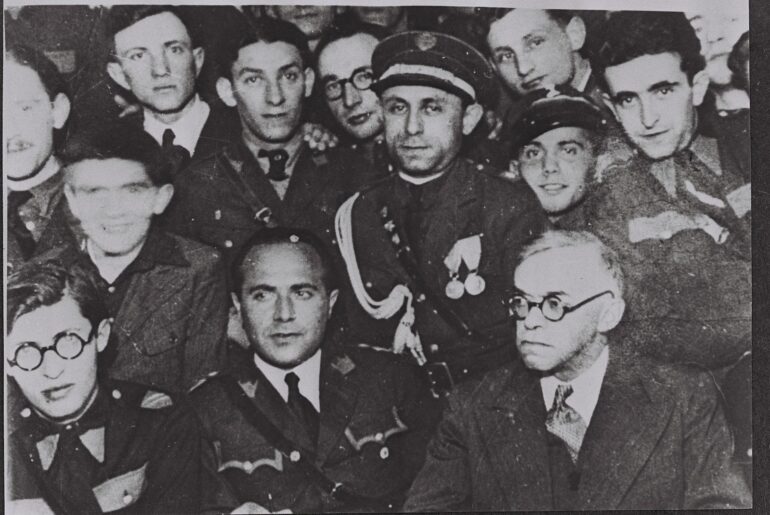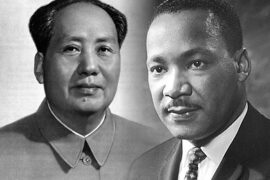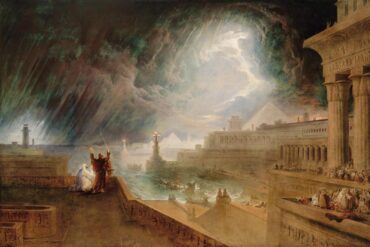Jews suffer in silence.
It is a rule of life; a way of the world. No one has heard our screams; and whenever they had, they plugged their ears waiting for the haunting silence to follow. Between the concrete walls of gas chambers, behind the fences of ghettos, from within the inquisitor’s furnace, and in the kibbutzim of the Gaza envelope our screams were as valuable as the puff of smoke we became.
While there is much to criticize about the “hasbara industry’” and its ineffectiveness in narrating the Jewish story or its refusal to incorporate the Palestinian story into its activism, we must confront something that many of us are avoiding. We must see what Leḥi (Fighters for the Freedom of Israel) saw on that fateful day in 1938 during the Betar conference in Warsaw, which came to be known as the episode of the “squeaky door.”
In Stern: The Man and His Gang, Z’ev Golan recounts that when Menaḥem Begin suggested armed resistance in the liberation of our homeland, Z’ev Jabotinsky likened his idea to a “squeaky door serving no purpose.”
Coming to Begin’s defense, Dr. Israel Eldad reminded Jabotinsky that sometimes a squeaky door alerts people to the presence of intruders. The rift between the revolutionary vision of Eldad and in this case even Begin on the one hand and the Revisionist Political Zionist vision of Jabotinsky can be understood in their approach to the West. The former two understood that the West – at that time represented by Britain – would always prioritize its interests over that of morality, while the latter believed that some level of moral clarity could override imperialist instinct.
Golan writes, “Implied by the tools adopted by Political Zionism was faith in the world’s conscience.”
Political Zionism was so indebted to this concept that Jabotinsky allegedly suggested that Begin might as well drown himself in a river if he did not accept it. Needless to say, Begin did not drown but eventually assumed command of the Etzel (National Military Organization) and followed Leḥi‘s armed struggle against British rule in the Jewish homeland.
Today, after more than eight months of bloody war across our country, few have acknowledged our pain.
The Jewish people have experienced a campaign of gaslighting and propaganda, whose ferocity and relentlessness has never been seen before. All of this while our loved ones are being martyred and their lives upended. Interestingly, however, few of us have posted the graphic scenes of brutal violence committed against our people on social media. While Palestinian media is saturated with images (both real and fake) of bloodied corpses and injured Gazans, I am yet to see the full unedited raw posts showing the atrocities committed against us.
The reasons for this are multifactorial.
First, we know deep down that Begin and Eldad were right. Such graphic imagery would accomplish nothing because the world currently has no conscience. It is too steeped in depravity, idolatry, and confusion to arrive at coherent moral conclusions, especially as it pertains to suffering Jews. It’s our job to change that reality.
Second, we love and respect our people too much to do so. We cannot fathom humiliating our martyrs or their families further than that which has already been done. Our Torah forbids us from bringing shame onto others, and commands us to love our fellow as ourselves. Just as many of us would likely not approve of our own desecrated bodies being blasted on the world stage, so we do not subject our brothers and sisters to the same fate. In so doing, we fulfill the commandment to love our fellow as ourselves, with special emphasis on “as ourselves.”
The psychological and spiritual toll this war will take on us could take generations to heal – that even those “allies” who showed us support and compassion mostly did so to further their own agendas. No one seems to genuinely care about our tear-soaked widows, orphans, or bereaved father. No one appreciates what it means to wake up one morning only to find oneself in an underground dungeon for nearly a year not knowing what the next minute will bring. And even if they did, it wouldn’t matter.
Ironically, both Israelis and Palestinians have felt the moral rot of the world weigh down on our shoulders.
Both Israeli and Palestinian media are flooded with posts recoiling in horror at the apathy of the world and the absence of its conscience.
Ironically, Israelis and Palestinians are yet to discover that after the dust settles and our respective fanbases forget all about this war, all we will be left with is each other.
To quote from the poem In Jerusalem by Palestinian poet Mahmoud Darwish, we will look to each other and say, “You killed me… and I forgot, like you, to die.”





